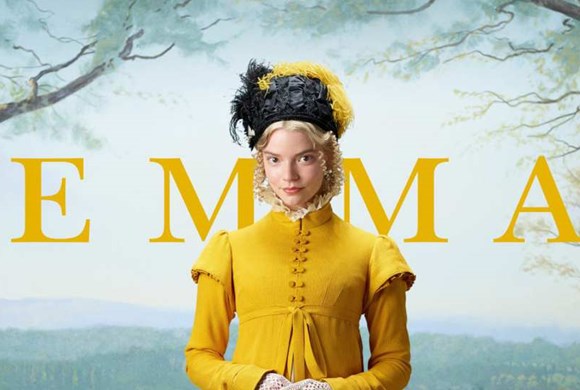It’s 1815, the grass is green, the land is lush, a furtive glance in the haberdashery, is love in the air? It certainly isn’t for Emma Woodhouse (Anya-Taylor Joy), the protagonist of the eponymous Austen novel, and the heroine of Autumn de Wilde’s new adaptation of this story. The cast is heavy-loaded, with Johnny Flynn (who sings the closing track) as a male love interest, the guy from God’s Own Country (Josh O’Connor), another male love interest, and that guy from Captured (Callum Turner), as a…have a guess. Likewise, there is a superb female cast, with a cracking performance by Miranda, though Mia Goth also deserves significant praise for her role as the timid accomplice to Joy’s unflinching Emma. Also think I missed out on Bill Nighy earlier on. So yes, you will be spending a fair amount of the first act asking yourself, “what were they in again?”. I personally didn’t mind this, the performances all round were noteworthy.
The film is undoubtedly close to the book. Indeed, de Wilde treats us to some lovely Austen quotes, not least that ‘You must be the best judge of your own happiness’. And so we follow Emma on her journey, as she learns how to reconcile her duties to herself, her status, her father, with passion and empathy, that joie de vivre. Or perhaps I’ve butchered the meaning already, as I’ve never read Austen. But I suppose that’s the test: should you have an understanding of Austen to be able to enjoy this? And unfortunately this was where ‘Emma’ fell short. As for the lavish sets, the witticisms, and stellar cast, this film felt too bogged down in its own characters, and too indulgent of its own open-spaces. Sure, one might then say, how are you supposed to do Austen? But I’ve enjoyed previous Austen, indeed, I feel Joe Wright’s 2005 ‘Pride and Prejudice’ should be the benchmark here (and a 86% Rotten Tomatoes agrees with me). In the case of ‘Emma’, the story-telling lacked muster, and the pace suffered as a result. Large gaps in the first two acts felt clunky, often filled by a strangely jangled score. Did Billy Mack write the score? Furthermore, why the all-white cast? In a month where you have the diversity of Armando Ianucci’s ‘The Personal History of David Copperfield’, this film’s casting by contrast felt antiquated.
That said, it’s been a cracking couple of months: this week alone I was fortunate enough to see both ‘1917’ and ‘Parasite’, extraordinary cinema. And ‘Emma’ is not a bad film, it’s certainly a must-see if you’re an Austen fan, greater yet if you’ve read the novel. But it does not push significant cine-boundaries, and therefore lacks the oomph that other period pieces (not just Ianucci’s Dickens adaptation, but also ‘Little Women’ for its clever story-telling) have done in the last month.
Image Credit: Lichfield Garrick

